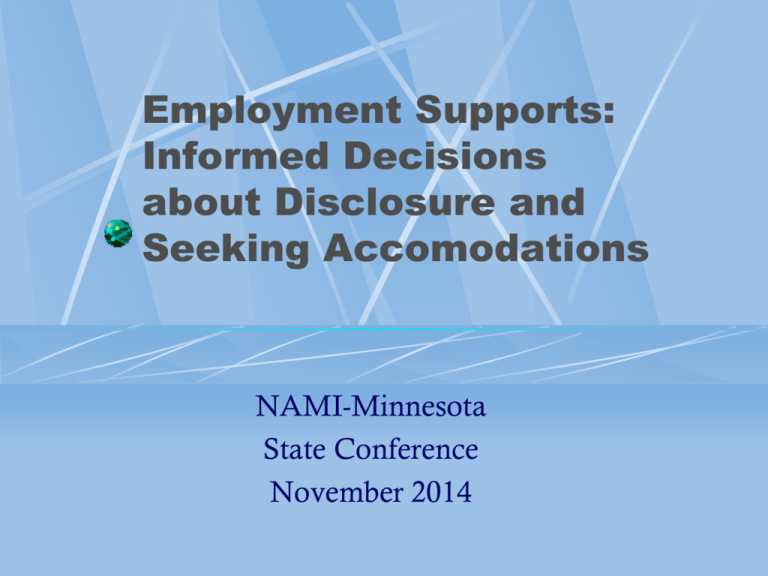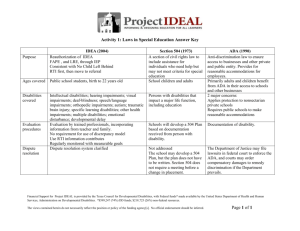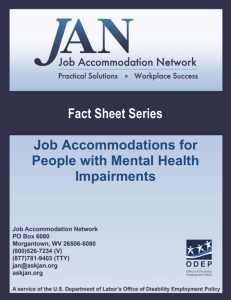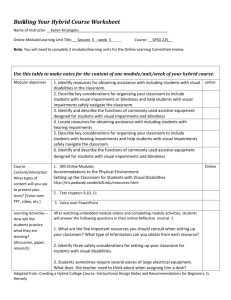accomodations and support
advertisement

Employment Supports: Informed Decisions about Disclosure and Seeking Accomodations NAMI-Minnesota State Conference November 2014 Employment Support Services Handout There are a variety of programs and services that can help youth and adults with mental illness who want to seek employment. Some programs are available to all people and some are targeted for people with disabilities. Do I have a “Disability”? Many people who think of disabilities think of people with blindness, deafness or those who use a wheelchair. Mental Illness can be a disability when it substantially limits one or more major life activities It is always up to you whether to disclose your mental illness as a disability This presentation will provide resources and options to help guide your decisions Mental Health Impairments The National Alliance on Mental Illness (NAMI) defines a mental health impairment as: a medical condition that disrupts a person's thinking, feeling, mood, ability to relate to others, and daily functioning. Just as diabetes is a disorder of the pancreas, mental health impairments are medical conditions that often result in a diminished capacity for coping with the ordinary demands of life. www.nami.org 4 Common Mental Health Impairments Anxiety Bipolar Disorder Major Depression Obsessive Compulsive Disorder (OCD) Panic Disorder Post-Traumatic Stress Disorder (PTSD) Seasonal Affective Disorder (SAD) Schizophrenia 5 Can employers ask me about my mental illness? Employers are not legally allowed to ask about a disability (including mental illness) when hiring, and prospective employees do not need to disclose one. If an employer does learn about a disability, that disability cannot legally be a reason not to hire someone. Once an offer of employment has been made, employers are allowed to ask more questions about an employee’s ability to perform her job duties, as long as they ask all employees the same questions. Can employers discriminate against me? Employers may not discriminate on the basis of disability, but employees must be able to perform the essential functions of the job with our without reasonable accommodations. Do I have to prove my disability? If a reasonable accommodation is required, any employer with fifteen or more employees must provide it. An employee may be required to provide written documentation of the limitations caused by a disability from a medical or mental health provider. What is an accomodation? Job Accommodations enable people with disabilities to perform essential job functions, be productive and accomplish work tasks with greater ease and independence. Common examples include modifications such as ergonomic desk chairs, reserved parking, flexible schedules, telecommuting, alternate workstations and periodic rest, food or bathroom breaks. According to the Job Accommodation Network (JAN), nearly 60 percent of the accommodations needed by workers with disabilities cost absolutely nothing, and only 36 percent of employers incurred a one-time cost of roughly $500. Does an employer have to accommodate me? A reasonable accommodation in employment is an adjustment to a workplace or position that allows the employee equal access to the workplace without posing an undue hardship to the employer. The employer is not required to lower performance standards or remove essential job functions Mental Health Impairments and Common Work Issues Attendance Concentration Emotions Fatigue Memory Organization Panic Attacks Sleep Disturbances Stress Coworker Interaction Working Effectively 11 Disclosure! Why wouldn’t people with mental illness want to disclose? STIGMA FEAR DISCRIMINATION People should make informed choices about disclosure-it should never be assumed Benefits of disclosing Reduce worry about hiding experience and being open about day to day affairs Find others who approve and have similar experiences Find someone who can provide assistance in the future Sense of personal power Act as a living testimony against stigma Allows for a job coach at the worksite Allows for an informed third party in discussions about accommodations Cost of disclosing Disapproval, social ostracism, subject of gossip, teasing Discrimination Increased anxiety due to worry about others perceptions of you-everything about you get’s put in the mental illness box Relapse may be observed by others-others watching you Impact career advancement/promotions negatively May not fit with self image Culturally mental “illness” with limitations, may be rejected by some people In order to disclose. . . People need to be educated about their own mental illness Decide what and when to disclose…some people may need less information Pick and choose when to disclose and under what circumstance and to whom Feel in control of how much to tell Rehearse disclosing if that would be helpful Three Steps to Informed Disclosure Decisions Determining the Need for Disclosure Evaluate the Pros and Cons Gather all the Facts Deciding How to Disclose-3 Steps 1. When: During Job Development, Resume, Cover letter, Telephone Call, In Interview, After Interview, After Job Offer, After Job Acceptance, After Job Start… 2. To Whom 3. What To Say When Disclosing: Describe needs in functional terms What an employment specialist may say to an employer on your behalf: Example: Limited interpersonal/social skills “Joe hasn’t worked in a long time. He may appear guarded in the interviews and he may not look you in the eye. He is very quiet when he meets new people. He will warm up to others over time and once hired he will be able to do the job.” Examples Rosanne: Associate editor at publishing company. Found job on her own. Interviewed independently after rehearsing with placement specialist Does not want to disclose fears embarrassment and being treated differently Job supports are provided off-site. Focus on meeting with an employment specialist to discuss MH issues that may interfere with work, discussing co-worker and supervisor issues, practicing interpersonal skills, rehearsal of how to deal with difficult situations and benefits reporting and monitoring Mental Health Impairments Job Accommodations 19 What is an accomodation? Job Accommodations enable people with disabilities to perform essential job functions, be productive and accomplish work tasks with greater ease and independence. Common examples include modifications such as ergonomic desk chairs, reserved parking, flexible schedules, telecommuting, alternate workstations and periodic rest, food or bathroom breaks. According to the Job Accommodation Network (JAN), nearly 60 percent of the accommodations needed by workers with disabilities cost absolutely nothing, and only 36 percent of employers incurred a one-time cost of roughly $500. Accomodation: Mental Health vs. physical disabilities? Descriptive research studies show: Most accommodations for people with psychiatric disabilities require little to nothing in direct costs, and most frequently involve flexible schedules, interpersonal supports (e.g., job assistance by vocational rehabilitation service providers, interpersonal or other support interactions provided by supervisors and coworkers), and changes in job tasks or the training process. Mental Health Functional Limitations • Typically: Cognitive or interpersonal in nature. • Disclosure is necessary in accessing job accommodations • A complex process for which individuals need guidance in order to weigh both the risks and the benefits of disclosing and to make decisions about what to say, when, and to whom. • This issue is less complicated when employees with psychiatric disabilities are involved in employment (Supported Employment or IPS) services, since employment service providers often are actively involved in the disclosure and arranging of accommodations. Mental Health Impairments Work Issue: Productivity 23 Mental Health Impairments Example A production manager for a large manufacturer had bipolar disorder. His duties included working 40 hours per week with additional over time to complete and oversee paperwork and shipping orders. He was not meeting his production standards. 24 Mental Health Impairments Accommodation Issues: Concentration Reduce distractions in the work area: Space enclosures, sound absorption panels, or a private office White noise, music player, or environmental sound machines Uninterrupted “off” work time Desk organizers 25 Mental Health Impairments Accommodation Issues: Concentration Increase natural lighting or provide full spectrum lighting Divide large assignments into smaller tasks and goals Use auditory or written cues as appropriate Restructure job to include only essential functions Provide memory aids such as schedulers, calendars, email add-ons, or apps 26 Mental Health Impairments Accommodation Initially the employee was allowed to work 30 hours per week for one month, increasing to 40 hours per week for the next month. Then, the manager returned back to his regular schedule. He was also provided a work area that was away from noise and given earbuds to listen to music. He also met briefly with his supervisor once a week to discuss workload issues. 27 Mental Health Impairments Example A housekeeper with OCD repeatedly checked and rechecked rooms for supplies. She was not completing the number of rooms required during a shift. 28 Mental Health Impairments Accommodation Issues: Organization Use daily, weekly, and monthly task lists Use calendar with automated reminders to highlight meetings and deadlines Divide large assignments into smaller tasks and goals Use a color coding scheme to prioritize tasks Use electronic organizers or mobile devices / apps 29 Mental Health Impairments Accommodation The individual was accommodated with a computerized checklist for each supply listed for each type of room. 30 Mental Health Impairments Example A customer service representative with arthritis and major depression experienced extreme fatigue during the afternoon, which had an effect on her speed. 31 Mental Health Impairments Accommodation Issues: Fatigue Allow flexible work environment Provide a goal-oriented workload Reduce or eliminate physical exertion and workplace stress Implement ergonomic workstation design Regulate temperature and lighting 32 Mental Health Impairments Accommodation The individual was accommodated with a wireless headset, an special keyboard tray, and an ergonomic keyboard. 33 Mental Health Impairments Example A grocery store bagger with SAD had difficulty working an early schedule due to oversleeping. She also experienced fatigue and depression during late fall and winter months. As a result her attendance was erratic. 34 Mental Health Impairments Accommodation Issues: Sleep Disturbances Allow for a flexible start time Combine scheduled short breaks into one longer break Provide a place for the employee to rest during break Allow the employee to work one consistent schedule Provide work areas with natural lighting 35 Mental Health Impairments Accommodation She was accommodated with an afternoon schedule and was moved to the front of the store, which had windows that let sunlight enter her workspace. 36 Mental Health Impairments Example An electronic engineering technician with bipolar disorder had difficulty managing his emotions while experiencing the side effects of periodic prescription changes. 37 Mental Health Impairments Accommodation Issues: Emotions Encourage the use of stress management techniques to deal with frustration Allow telephone calls during work hours to doctors and others for needed support Allow flexible breaks Refer to EAP 38 Mental Health Impairments Accommodation The individual was accommodated with a more flexible schedule and allowed to take breaks to call his counselor when experiencing heightened emotions. 39 Mental Health Impairments Example A claims adjuster with a history of substance abuse was experiencing limitations from social phobia when interacting with the public. As a result he said several inappropriate things to clients. 40 Mental Health Impairments Accommodation Issues: Working Effectively Develop clear expectations of responsibilities and the consequences of not meeting performance standards Schedule consistent meetings with employee to set goals and review progress Allow for open communication Establish written long-term and short-term goals 41 Mental Health Impairments Accommodation The employee was given a temporary work schedule change to part-time for two weeks to attend the outpatient services he needed. He returned full-time to a later shift (when one became available) with flexible scheduling to attend counseling appointments. 42 Mental Health Impairments Example A real estate appraiser with migraine headaches and post-traumatic stress disorder became very stressed when her work environment was noisy. She became angry and was insubordinate to her supervisor. 43 Mental Health Impairments Accommodation Issues: Managing Stress Refer to counseling and Employee Assistance Program (EAP) Allow telephone calls during work hours to doctors and others for needed support Allow flexible work environment: • Flexible scheduling Modified break schedule Leave for counseling Work from home/Flexi-place Modify environmental triggers 44 Mental Health Impairments Accommodation The employee was given a headset to help reduce noise in her environment. She was also given a light dimmer to control her workstation lighting and help her with light sensitivity. She was also given time off when she gets migraines. 45 Mental Health Impairments Issue: Job Performance 46 Mental Health Impairments Example An electrician with severe depression needed to attend periodic licensure trainings. The person had difficulty taking effective notes and remembering information in the meetings. 47 Mental Health Impairments Accommodation Issues: Memory Allow use of job coach / Provide mentor Use auditory or written cues Allow additional training time Provide written checklists Use a color coding scheme to prioritize tasks Use notebooks, planners, sticky notes, apps to record information Provide labels/bulletin board to assist in locating items Provide minutes of meetings and trainings 48 Mental Health Impairments Accommodation The individual was accommodated with notes from a remote Communication Access Realtime Translation (CART) service. 49 Mental Health Impairments Example A woodworker/carpenter with a panic disorder experienced recurrent panic attacks when traveling during peak traffic times. He was required to pick up and order supplies when necessary. 50 Mental Health Impairments Accommodation Issues: Panic Attacks Allow the employee to take a break and go to a place where s/he feels comfortable to use relaxation techniques or contact a support person Identify and remove environmental triggers such as particular smells or noises Allow the presence of a support animal 51 Mental Health Impairments Accommodation He was accommodated with a schedule that gave him the opportunity to drop off and pick up materials when coming to work in the morning. 52 Mental Health Impairments Example An attorney with depression experienced memory deficits due to medication, affecting her ability to recall actions and activities during depositions. The attorney became frustrated and continued to miss and reschedule meetings. 53 Mental Health Impairments Attendance Allow flexible work environment: Flexible scheduling Modified break schedule Leave for counseling Work from home/Flexi-place Modify environmental triggers 54 Mental Health Impairments Accommodation The attorney was given an alternate site to take depositions. She was moved to a smaller conference room with natural lighting away from office noise. 55 Other disclosure examples Panelist experiences JAN JAN’s publication, the Employees’ Practical Guide to Requesting and Negotiating Reasonable Accommodations under the Americans with Disabilities Act (ADA) summarizes the provisions of the ADA, common accommodation issues and JAN’s practical solutions for resolving them. Resource: The Job Accommodation Network Contact (800)526-7234 (V) & (877)781-9403 (TTY) AskJAN.org & jan@askjan.org 58




